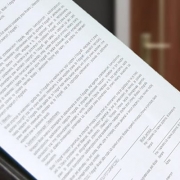Search Orders
What is a Search Order?
A Search Order[1] is a Court order made on application of a party that has commenced, or anticipates commencing, legal action (known as the applicant) against another person (known as the respondent), often ex parte, (namely, without notice to the respondent) for the purposes of securing and preserving evidentiary material that is/may be directly relevant to the proceeding.
The grant of a Search Order requires the respondent to permit specific persons to enter specific premises to search for the evidentiary material thought to be present.
A Search Order, especially when paired with an order for custody and control of the material obtained, prevents a respondent from interfering with discovery and thus frustrating a trial by destroying evidentiary material.
When is a Search Order available?
A Search Order will be granted where the Court is satisfied that:
- The applicant has a strong prima facie case on an accrued cause of action; and
- The potential or actual loss or damage to the applicant will be serious if the Search Order is not made; and
- There is sufficient evidence against the respondent that:
- The respondent possesses important evidentiary material; and
- There is a real possibility that the respondent might destroy such material or cause it to be unavailable for use in evidence in a proceeding or anticipated proceeding.[2] [Emphasis added]
What cases are Search Orders made in?
Search Orders can be made in various cases. Common examples include:
- Employee theft of confidential information and documents including but not limited to downloading of employer’s client database.
- Intellectual Property theft by any person, including trade-marks and copyright.
How to apply for a Search Order?
The applicant must file at Court an application and supporting affidavit setting out in detail:
- Reasons for the order.
- Description/categories of material sought in the search.
- Address of the search.
- Damage likely to be suffered by the applicant if the Search Order were not made.
- Details of the search party and their purpose.
- If residential premises, the likely identity of the occupant(s) (and whether it could be a child or vulnerable person).
What are the terms of a Search Order?
A Search Order may direct the respondent:[3]
- To allow the search party to enter the specified premises (which may include the respondent’s vehicles).
- To take any steps in accordance with the order.[4]
- To provide any information, thing or service described in the order.
- To take and retain in their custody any item described in the order.
- Not to disclose any information about the order, for up to three (3) business days after the date on which the order was served, except for the purposes of obtaining legal advice/representation.
- To do or refrain from doing any act as the Court considers appropriate.
- To comply with any other order the Court considers appropriate.
The Search Order will also specify the day and time for execution of the order, usually with an automatic expiry.
Is the respondent obliged to comply with a Search Order?
Yes.
- A respondent must comply with a Search Order, and must not obstruct its execution in any way, including but not limited to, hiding (suspected) evidentiary material or being untruthful to the whereabouts of same upon request.
- The respondent has a limited timeframe within which to seek legal advice about the Search Order, and limited lawful excuses for failure to comply.
- An applicant can only enter the respondent’s specific premises with their permission.
- If the respondent denies the search party access, the respondent may be found to be in contempt of Court, punishable by a fine, imprisonment, or both.
Who conducts the Search Order?
The Court will specify, name and describe, the members of the search party who are permitted to execute the order.
The search party is to include the following:[5]
- An independent lawyer[6] to supervise the search.
- A lawyer representing the applicant.
- A specialised independent computer expert to search the respondent’s computers for documents, and/or image the respondent’s computers.
- Other persons, such as a person able to identify things being searched for where difficulties of identification arise.
The search party should not include the applicant or any party associated with the applicant, other than the applicant’s lawyer(s).
The search party ought to contain as fewer persons as possible to minimise the disruption and inconvenience to the respondent, especially in circumstances where such an order involves the invasion of another’s privacy.
The role of an independent lawyer?
In addition to supervising the search, the independent lawyer must:
- Serve the Search Order, application, and supporting affidavit(s) upon the respondent.
- Explain the terms of the Search Order to the respondent, and that the respondent has the right to obtain legal advice.
- Before removing items from the premises, compile a list of same, allow the respondent a reasonable opportunity to check the correctness of the list, sign the list, and provide the parties with a copy of the list.
- Take custody of all items (including electronic items and data) removed from the premises until further order.
- Return any electronic items and data to the premises within the time prescribed by the Court.
- Submit a written report to the Judge within the time prescribed by the Court.
- Attend the hearing on the return date of the application (return date) and have available to bring to Court all items removed from the premises.
- On the return date:
- release material that has been removed from the respondent’s premises or to provide information to the Court.
- may raise any issue before the Court as to the execution of the Search Order.[7]
Are there risks in applying for a Search Order?
Appropriate undertakings to the Court will be required of the applicant, the applicant’s lawyers, and the independent lawyer.
- The undertaking required of the applicant will include an undertaking as to damages, which may include a form of security.
- The applicant’s lawyer is to undertake to the Court to pay the reasonable costs and disbursements of the independent lawyer and any specialised independent computer expert.
- The applicant’s lawyer is to undertake not to disclose to the applicant any information that the lawyer has acquired during or as a result of execution of the Search Order without the permission of the Court.
The release of the undertaking(s) in whole or in part may be sought on the return date.
The bottom line
Given the complexities and level of preparation involved in obtaining and executing a Search Order (and the risk of losing evidentiary material if no Search Order is made), it is highly advisable to obtain legal advice prior to making such an application from experienced practitioners.
Advancing your position
Leventis Lawyers is experienced in obtaining Search Orders in difficult and urgent circumstances, and has successfully obtained Search Orders in a range of cases.
iustita in veritate est
[1] Previously known as an Anton Piller order, taken from the seminal case Anton Piller KG v Manufacturing Processes Ltd [1976] 1 ALL ER 779 until 1 May 2007 when replaced by the procedure for Search Orders under r 148, Supreme and District Court Civil Rules 2006 (SA) (Rules).
[2] Rule 148.
[3] Ibid.
[4] May include searching for, inspecting or removing the item, and making or obtaining a record (a copy, photograph, film or sample) of the item or an information it may contain.
[5] Rule 144, Supreme and District Court Civil Supplementary Rules 2014 (SA) (Supplementary Rules).
[6] The independent lawyer must not be a member or employee of the applicant’s firm of lawyers, and must be experienced in commercial litigation preferably in the execution of Search Orders: Supplementary Rule 145.
[7] Rule 146, Supplementary Rules.



